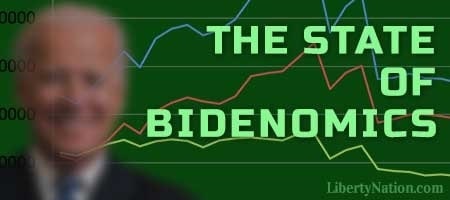Looking back at 2023, what stands out the most to you? Was it the so-called Barbenheimer event? The rise of Swiftonomics? Shohei Ohtani securing a $700 million contract, the largest in all of sports? It was an eventful year, and for the average person, it might have been all about the economy, stupid. So, let’s take a walk down memory lane and comb through the biggest econ-related stories of 2023.
The Banking Crisis
When the world welcomed 2023, many might have thought that everything would be about inflation. It turns out that a banking crisis was forming, too. Silicon Valley Bank cratered one weekend in March, shortly followed by Signature Bank. A few weeks later, First Republic folded and was scooped up by JPMorgan Chase. The cause? There were many reasons, but the primary factor was that the management team invested customers’ deposits into long-term Treasury securities, which tanked in response to the Federal Reserve’s quantitative tightening initiative. Meanwhile, as the year went on, two more financial institutions shuttered: Heartland Tri-State Bank and Citizens Bank. Despite the widespread panic, US government officials insisted that the financial system was sound, stable, resilient, and highly liquid. However, Washington sprang to action to bail out the banking sector, with the Federal Reserve launching an emergency lending facility that is still being used heading into 2024. Related: Silicon Valley Bank Collapse: A Crisis in the Making?
Inflation: A Never-Ending Story

(Photo by: Jeffrey Greenberg/Universal Images Group via Getty Images)
Contrary to what Keynesian economists Paul Krugman and Joseph Stiglitz may say, inflation has not been vanquished from the US economy. The growth rate of the consumer price index (CPI) is not at the level it was in June 2022, but it is still climbing at a slower pace. The Eccles Building does not expect the annual inflation rate to touch the 2% target level until 2025. To quote the woman who will never become president, Hillary Clinton, “What difference, at this point, does it make?” Indeed, cumulative inflation is around 18%, with various other critical goods and services, from food to rent to electricity, up more than 20%. So, even if the CPI or the Fed’s preferred personal consumption expenditure (PCE) price index reaches 2% permanently, the damage has already been done. This 2% will be on top of the rest of the post-pandemic inflation. Related: Mission Accomplished on the Inflation Front?
Labor Strife in America
When was the last time the US economy endured labor strife in so many sectors? While demonstrations at the Big Three – Ford, General Motors, and Stellantis – dominated the headlines and economic analysis (and President Joe Biden’s schedule for 80 minutes) in 2023, other industries witnessed labor upheaval: entertainment, health care, leisure and hospitality, UPS, airline pilots, and even SPAM workers. All of the chaos has been resolved to finish the year, but it does provide a lesson that inflation bombs produce collateral damage, including work stoppages by disgruntled workers. Related: Bidenomics, Politics, and Labor.
Debt Ceiling Crisis Averted
 As usual, Republicans and Democrats engaged in the theatrics this past spring. This time, the White House and lawmakers agreed to raise the debt ceiling until 2025, adding roughly $4 trillion to the national debt when the nation flips the calendar. President Biden celebrated his deal with then-House Speaker Kevin McCarthy (R-CA), saying that “no one gets everything they want in a negotiation.” However, the GOP leadership failed to secure anything substantive, as it trimmed spending by only $12 billion this year. Additionally, it provided just $50 billion in long-term savings, enough to cover maybe a month’s of interest payments. Political observers argue that this was the catalyst for ousting McCarthy from his position. Related: Debt Ceiling fFx? Rinse, Cycle, Debt, Repeat.
As usual, Republicans and Democrats engaged in the theatrics this past spring. This time, the White House and lawmakers agreed to raise the debt ceiling until 2025, adding roughly $4 trillion to the national debt when the nation flips the calendar. President Biden celebrated his deal with then-House Speaker Kevin McCarthy (R-CA), saying that “no one gets everything they want in a negotiation.” However, the GOP leadership failed to secure anything substantive, as it trimmed spending by only $12 billion this year. Additionally, it provided just $50 billion in long-term savings, enough to cover maybe a month’s of interest payments. Political observers argue that this was the catalyst for ousting McCarthy from his position. Related: Debt Ceiling fFx? Rinse, Cycle, Debt, Repeat.
Oh, About the National Debt
On Jan. 3, 2023, the national debt was $31.351 trillion. At the end of 2023, it is around $34 trillion. You do the math, carry the one, rub your eyes, and discover that Washington added approximately $2.6 trillion to the national debt in a single year. Interestingly enough, most of the increase occurred soon after the Biden-McCarthy arrangement. That’s not all, folks. The US government recorded a $1.7 trillion budget deficit, one of the highest on record. Annualized interest payments were north of $1 trillion. In the first two months of fiscal year 2024, Washington is already running a shortfall of around $380 billion. Related: Drowning in the Deficit Swamp.
Feeling a Downgrade
For the first time since former President Barack Obama, the US government was slapped with a credit downgrade. Fitch Ratings surprised everyone on Aug. 1 by announcing that it downgraded the US long-term foreign-currency issuer default rating from AAA to AA+. The agency blamed “a steady deterioration in standards of governance over the last 20 years, including on fiscal and debt matters.” Moody’s Investors Service weighed in, trimming its rating outlook on the US government from “stable” to “negative” and citing the nation’s fiscal health and “continued political polarization.” The White House and Wall Street largely dismissed these downgrades. But should they have been ignored? The next decade will be pivotal for America’s finances. Related: Biden Earns US Another Rating Downgrade.
Jobs, Jobs, Jobs
 In the first 11 months of 2023, the US economy added an astounding 2.552 million new jobs. (The December data will be published on Jan. 5.) The unemployment rate remained below 4% all year long. It was another remarkable year for the labor market, defying all expectations. Of course, the data underneath the hood painted a different portrait of conditions. But when everyone scans the headline numbers, the employment growth has been impressive (too bad real wages are still down about 3% from 2021). That said, the one area that many economists noticed was the size and frequency of revisions. As of Dec. 8, the number of jobs that vanished from the US economy is around 400,000. Of course, expect even more modifications to the 2023 data well into 2024 when everyone has forgotten or no longer cares. Related: The Curious Case of More Revisions in Latest Jobs Report.
In the first 11 months of 2023, the US economy added an astounding 2.552 million new jobs. (The December data will be published on Jan. 5.) The unemployment rate remained below 4% all year long. It was another remarkable year for the labor market, defying all expectations. Of course, the data underneath the hood painted a different portrait of conditions. But when everyone scans the headline numbers, the employment growth has been impressive (too bad real wages are still down about 3% from 2021). That said, the one area that many economists noticed was the size and frequency of revisions. As of Dec. 8, the number of jobs that vanished from the US economy is around 400,000. Of course, expect even more modifications to the 2023 data well into 2024 when everyone has forgotten or no longer cares. Related: The Curious Case of More Revisions in Latest Jobs Report.
AI’s Explosion
The explosion of artificial intelligence in 2023 has been remarkable. It has been a subject discussed for years, and then it came out of nowhere, thanks to OpenAI’s ChatGPT. This forced Google and Meta to accelerate the development of their own AI chatbots. X also released Grok, which industry experts say is more up-to-date and less woke than its AI counterparts. AI has been the key term in companies’ quarterly earnings calls and analysts’ notes in the financial markets. Suffice it to say, good or bad, AI is here to stay. Related: Artificial Intelligence – Smart but Unhinged.
A Housing Market on Ice
The average 30-year fixed-rate mortgage touched its highest level in more than 20 years, hitting 7.79% in October, according to Freddie Mac’s Primary Mortgage Market Survey. Mortgage rates have trended downward since the crash in US Treasury yields in the wake of the Federal Reserve signaling the loosening of monetary policy conditions in 2024. But the rising-rate environment manufactured an interesting dichotomy in the US real estate market: Existing home sales have mainly plummeted while new home sales have mostly risen. Why? Homeowners do not want to abandon their humble abodes, especially if they secured these residential properties with 3% mortgages. Housing inventories were already below-trend before the coronavirus pandemic. The Fed’s inflation-fighting response further exacerbated the situation. Related: Housing Affordability Is Crashing in America.
The Rise of Javier Milei
Javier Milei, an economist-turned-president of Argentina, rose to international stardom thanks to X posts covering his entertaining media appearances. Aside from his television interviews depicting leftists as [insert curse word here], his public policies made libertarians excited: the abolition of the central bank. While it has yet to come to fruition, even the idea of proposing the demolition of the institution as a primary policy plank is enough to make libertarians hopeful. Moreover, in one of his first acts as head of state, Milei took his chainsaw to the government and implemented shock therapy by eliminating the Ministry of Culture and slashing state jobs. Related: Can Javier Milei Save Argentina From Economic Ruin?




